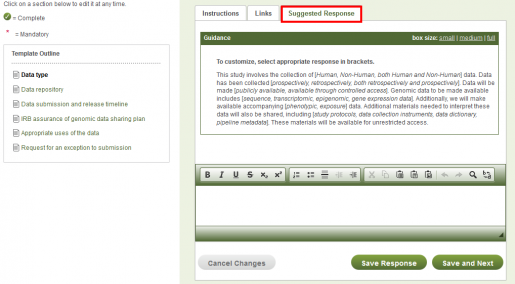![]() A Data Management Plan (DMP) is a formal document describing how your data will be managed during your research and after the project is completed, including sharing resulting data with other researchers, and archiving the data for future access and use. With requirements for DMPs increasing among major research funders such as the National Institutes of Health (NIH) and the National Science Foundation (NSF), where can researchers quickly find assistance writing a DMP?
A Data Management Plan (DMP) is a formal document describing how your data will be managed during your research and after the project is completed, including sharing resulting data with other researchers, and archiving the data for future access and use. With requirements for DMPs increasing among major research funders such as the National Institutes of Health (NIH) and the National Science Foundation (NSF), where can researchers quickly find assistance writing a DMP?
The DMPTool, an online system guiding researchers in completing this key component, can be accessed on the DMP tab of the HSLS Data Management Guide. The DMPTool has been customized for the University of Pittsburgh: simply select the University of Pittsburgh from the drop-down menu on the Institution Log In page. Log in with your Pitt credentials on the Web Authentication page.
The DMPTool offers templates for NIH, NSF, and other funders, but an important new template is “NIH-GDS: Genomic Data Sharing,” written specifically for the new NIH Genomic Data Sharing Policy (GDS). The customized GDS template offers suggested responses and guidance from Pitt’s IRB and Office of Research (OOR) in one location.
To get started using the GDS template, click on Create New DMP, then Select Template. In the list of templates, click on National Institutes of Health to reveal two NIH templates. Select NIH-GDS: Genomic Data Sharing.

After providing some proposal identification information you will be asked to enter the DMP details. The template outline is on the left. The workspace on the right has three tabs: “Instructions” are from the NIH-GDS; “Links” connect to Pitt and NIH-GDS resources; “Suggested Response” is a customized response, added by HSLS librarians, that researchers may modify as appropriate, and includes pertinent fields populated with selections (in brackets) to be made by the investigator. Do not submit without editing to describe your specific study and data.
While the DMPTool offers excellent guidance and sample documents throughout the DMP writing process, Pitt health sciences researchers preferring to review their DMP with a librarian are welcome to contact the HSLS Data Management Group.
~Andrea Ketchum